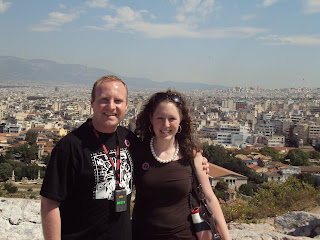 |
| My Barros Luco con palta |
Javier and I first started working together on a market intelligence project in early 2010. We hadn't met in person, but would frequently connect over the phone or instant message. A few weeks into the project, an 8.8 magnitude earthquake rocked central Chile, killing 525 people. Upon seeing the news, I immediately called Javier to make sure he was okay, and was relieved to hear he and his family were safe. We continued to discuss the destruction in Santiago, and I told him I was praying for him and all of the people of Chile. And that's when our relationship changed.
 |
| wreckage from the 2010 Chile earthquake |
A few months later, I had the opportunity to travel to Santiago, and met Javier in person for the first time. He took me to a Peruvian restaurant, and over dinner he told me how much my prayers meant to him. He said when I told him I was praying for him, he could sense the sincerity in my words, and he asked me about my faith. Javier told me he, too, is a Christ follower, and it formed an immediate bond between us.
As we continued to discuss our faith, I became more and more amazed. We had grown up in completely different cultures, speaking different languages, watching different TV shows, eating different food, having different political viewpoints, and yet we were brothers in Christ. We shared the same worldview, the same love for others, the same struggles and temptations, the same beliefs in a loving, personal God, and the same need for grace. Javier taught me an important lesson that night: Jesus was not an American.
 |
| Javier with his fiancee |
As Javier shared more with me, I saw how our cultures place different obstacles in front of Jesus. In America, we have imbeciles such as Pat Robertson making outlandish claims in the name of God (I think my favorite was his claim to being able to leg press 2,000 pounds), and we've created an entire sub-culture with specific rules about the music you have to listen to, the books you have to read, and the bumper stickers you must emblazon your car with in order to be a "true Christian." In Chile, a common barrier is people are more concerned with being Catholic than they are with following Jesus. That's not a criticism of Catholicism (Javier himself is a Catholic), but rather a criticism of how we often get so caught up in rituals and how our culture defines religion that we completely miss out on a relationship with Christ. The need for Jesus is universal, but the cultures around the world vary greatly, as do the cultural obstacles placed in front of Christ.
Last spring, during a brief visit to Athens, Ashley and I had the opportunity to visit Mars Hill, also known as the Areopagus. It was on Mars Hill where Paul preached to the Athenians, as recorded in Acts 17. During the sermon, Paul quotes the local poets and discusses the specific idols worshiped by the Greeks. He took the time to understand their culture, and thus was able to present Jesus in a way they could understand. He didn't have to alter Jesus or his message in any way, he just had to put him in their context. As I stood on that big rock, I reflected on Paul's message, and thought about how I need to stop pushing my white, American, capitalist, Republican Jesus, and rather just engage the culture around me and share the Jesus who does not put up obstacles to a relationship with him. I just want to share the Jesus who is relevant to all cultures, who died for all peoples, and who connects us all to the God who created us.
 |
| Ashley and I on top of Mars Hill in Athens |
I'm thankful for the time I'm getting in Chile this week, I'm thankful for what Javier has taught me about the cultural universalness of Christ, and I'm especially thankful for these delectable avocados. Yet I know my ministry isn't here. I don't know the language, I can't quote their poets, and I don't understand the barriers their culture has placed in front of Jesus and how they should be broken down. But Javier does. So I will continue to pray for him and encourage him in any way I can, and I will continue to thank God for giving me a brother and dear friend in Chile.
What I'm listening to during this post: "Portraits" by the Wheeler Brothers



